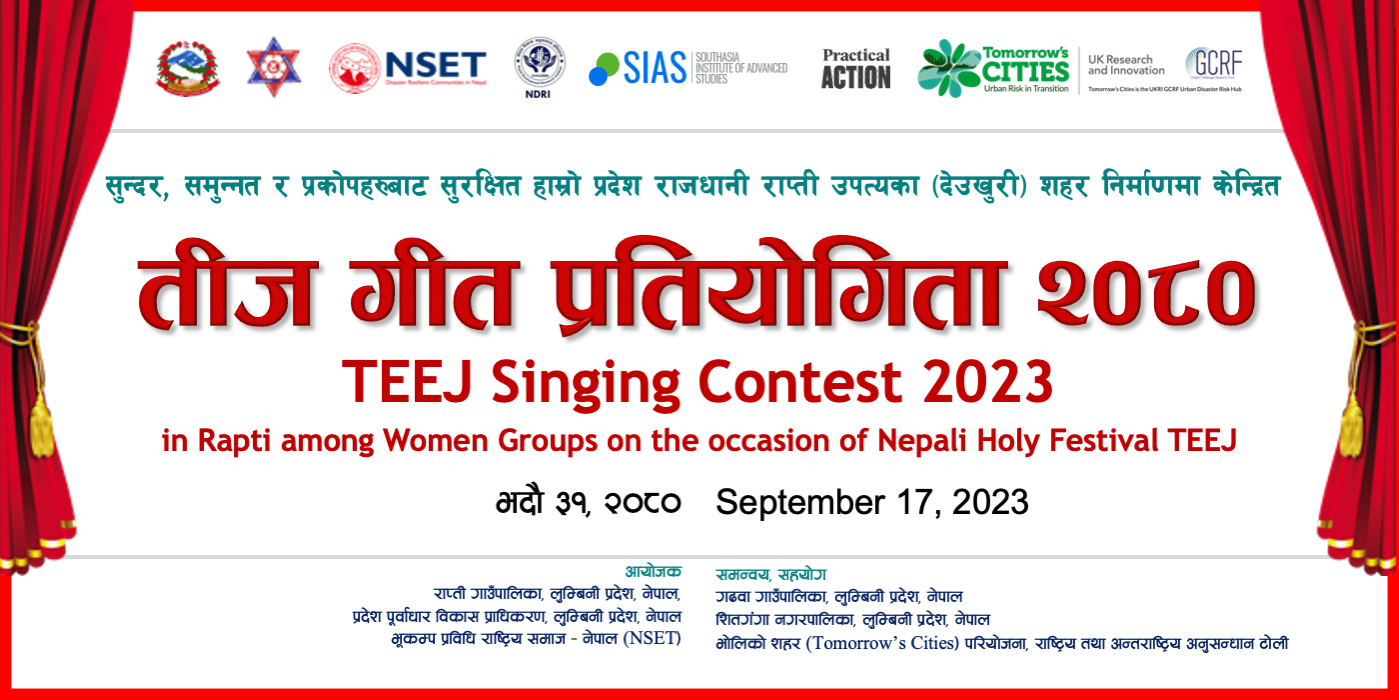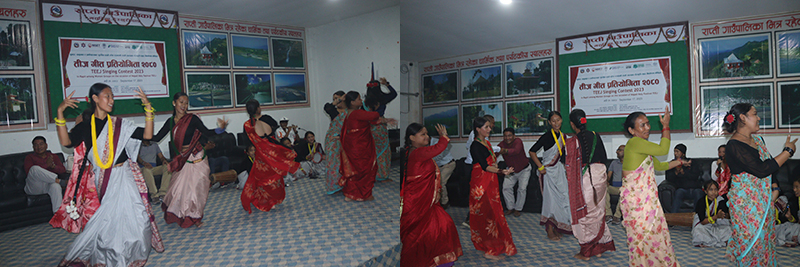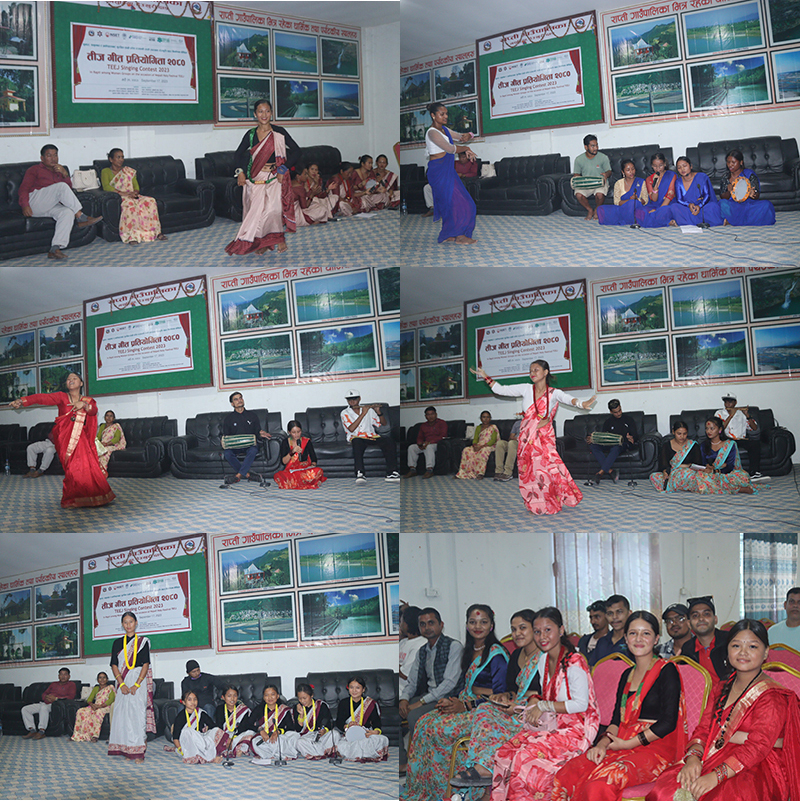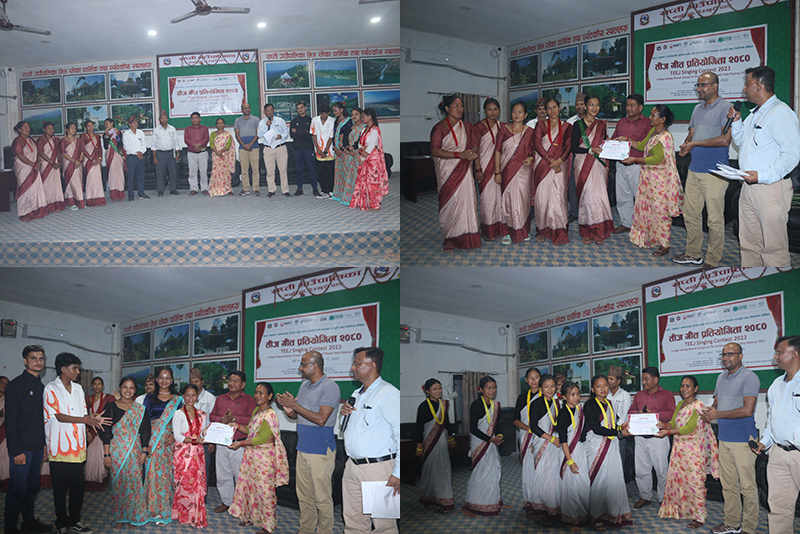
Teej singing contest 2023
Women Groups from Rapti Valley (Deukhuri) in Nepal have expressed in singing their future aspirations and wishes to build Tomorrow’s Rapti City resilient to the risks of multi-hazards. They have raised their concerns to consider multiple hazards while developing and implementing plan for the Lumbini Provincial Capital City (LPCC), Rapti City. Rapti faces risks from various hazards, notably earthquake, flood, landslide, fire, epidemics & others. Tomorrow’s Cities is providing technical support to reduce disaster risks and build resilience in future Rapti city.
The women groups from the Rapti Valley (Deukhuri) participated in a Singing Contest organized in Rapti while marking TEEJ festival. TEEJ is a popular festival of Nepali Hindu women celebrated with joy and hope. TEEJ Singing is one of the main components of this celebration. The contest was focused on the theme of making planned, inclusive, equitable and resilient future Rapti City where women groups could express their wishes, aspirations and ideas for making disaster resilient Rapti city. The event was organized in Rapti on September 17, 2023 with the support from Tomorrow’s Cities project.

Participants and Organizers dancing on TEEJ Songs
Chairperson Prakash Bista from Rapti Rural Municipality, in his opening remarks, welcomed all the participants and highlighted the importance of the theme selected for the day. “We are now in the planning phase to develop our new city considering aspects of planned urban development and ensuring new city that is disaster resilient too”, Mr. Bista remarked.
The event was also attended by Vice Chairperson from Rapti, Ward Chair from Shitaganga and also representatives from PIDA and Tomorrow’s Cities project.
The TEEJ Singing Contest was jointly organized by Rapti Rural Municipality, Provincial Infrastructure Development Authority (PIDA), Lumbini Province and National Society for Earthquake Technology – Nepal (NSET) in coordination with Gadhawa Rural Municipality, Shitaganga Municipality and Tomorrow’s Cities, International & Nepal Partners.
There were total 5 teams from different wards of Rapti and Shitaganda Municipalities contesting:
- Janamukhi Women Group, Shitaganga -8 led by Ms. Khimsara Ale.
- Women Group, Shitaganga -9 led by Ms. Bimala Pariyar.
- Women Group, Rapti -4 led by Ms. Juna KC.
- Deukhuri Today led by Ms. Srijana Thapa.
- Langhali Yough Club, Shitaganga -8 led by Ms. Dhurmati Gharti.

Participating Teams
The contestants focused on how we could build Tomorrow’s Rapti City resilient towards Multi-Hazard Risks and make a planned, safer, inclusive, equitable and prosperous city to live in.
A team led by Ms. Khimsara Ale from Shitaganga-8 voiced for securing enough open spaces while planning new Rapti city. They have asked to prioritize building better education and health facilities and also stressed creating job opportunities. The contestants stressed on earthquake resistant construction of housing and other infrastructures which are also resilient other hazards like floods and land slides. They shared on how terrible it was to face floods, land slides, fire in the localities in the past also facing global epidemics, the COVID-19. They aspired to have future Rapti city safe from all types of disaster risks.
Some extracts from their singing are as follows:
घाम अस्ताउने जुन उदाउने आउँछ पालो फर्केर
राजधानीमा स्वागत गर्छौं फुल छर्केर ।
आगो, भूकम्प, पहिरोमा सयौं धनजन मुछिए
छोरा गुमाए छोरी गुमाएर सिन्दुर पुछिए ।
आपत, विपत् प्रकृतिको नियम हुन्न नकार्न
भूकम्परहित दिगो विकास गरौं सपार्न ।
उदाहरण दिन सकौं लुम्बिनीलाई जहाँ नि
नहोस् कतै एकादेशको हाम्रो कहानी
सपनाको राजधानी हेर्ने हाम्रो चाहना
हरितालिका तीजको सबलाई शुभकामना ।
“Sun sets, Moon rises turn by turn
We welcome you with the flowers.
Lost much in Fire, Earthquake, Landslides
Lost sons, daughters, and spouses too.
Can’t avoid hazards and nature’s law
But lets do sustainable and disaster resilient development
Wish we have Lumbini as an example –
Lets make it reality, not a tale!
We are willing to see our dream capital city,
We are now extending festive wishes to you all!”
उपस्थित आयोजक सम्पूर्ण दर्शकलाई
दुई हात जोडी नमस्कार गर्छौं सबैलाई
भूकम्परहित घरहरु बनाउनुपर्छ
खुला ठाउँ उचित ठाउँ राख्नुपर्छ
शिक्षा स्वास्थ्य सम्पन्न भएका शहर
रोजगारी पाउनुपर्ने सबको रहर ।
We extend our respectful greetings
to you all the organizers and audiences,
We should make earthquake resistant houses
And we need to maintain open spaces as well
Wish we have city with good education and health facilities
And job opportunity like everyone dreams for!
दाङमा स¥यो राजधानी बुटवललाई छाडेर
स्वागत गर्छौं यो मञ्चलाई दुई हात जोडेर
वर्ष दिनको तीज आयो सबै मिली मनाउने
सपना देखौं राजधानीलाई सुन्दर बनाउने
बाढी पहिरो भूकम्पले हरेक वर्ष सताउँछ
अकालैमा ज्यान जान्छ मन अत्ताउँछ
Capital city moved from Butwal to Dang
We welcome you all in this stage as well
Celebrating Teej festival after a year
Lets dream to have better capital city
Suffered frequently from Flood, Landslide and Earthquake
Many are killed and we feel panic!
The judge panel was composed of social activist, school teacher and DRR practitioner that decided winners of the Contest.
- The First Prize with Cash Amount NPR5000 to Team from Janamukhi Women Group.
- The Second Prize with Cash Amount NPR4000 to Team from Deukhuri Today.
- The Third Prize with Cash Amount NPR3000 goes to Team from Langhali Youth Club.
Vice Chairperson Ms. Kamalapati Chaudhary from Rapti Rural Municipaliuty awarded the winners with Certificate and Cash prize. She expressed her happiness to join such an event with social message and also congratulated the winners and participating teams.

Winners of the Teej Singing Contest awarded
This Singing Contest is a creative communication activity planned as a part of communication efforts under Tomorrow’s Cities Rapti program. The main objective was to enhance engagement of local women groups and community people on awareness raising for Tomorrow’s Rapti through live singing on the occasion of Nepali women’s special Teej Festival.
Event coverage by media:
- Nepal Television: NTV News on Teej Singing in Rapti
- Naya Yougbodh National Daily: https://nayayougbodh.com/news/2023/09/18/197718 (सपनाको राजधानी शहरबारे सोच निर्माण गर्न ‘तीजको भाका’)
- Deukhuri Today: https://deukhuritoday.com/main-news/46615 (सुन्दर, समुन्नत र प्रकोपबाट सुरक्षित राजधानीको शहर बनाउन तीज गीतको माध्यमबाट संदेश प्रवाह)
Reported by: Khadga Sen Oli (ksenoli@nset.org.np ) Communication Manager for Tomorrow’s Cities project from NSET Date: Sep 21, 2023
TEEJ – the Festival of Nepali Women
TEEJ Festival in Nepal is a holy festival of Nepali Hindu women celebrated with joy and hope. Teej, also known as Haritalika Teej, is a festival dedicated to Lord Shiva and Parvati. It is a three days long festival, in which women fast in the name of Lord Shiva for the long and prosperous life of their husband. Teej is one of the most famous festivals in Nepal.
Teej (romanized: Tīja), literally meaning the "third" denoting the third day after the new moon when the monsoon begins as per the Hindu calendar, is a combined name for 3 Hindu festivals primarily dedicated to Hindu deities - the mother goddess Parvati and her male consort Lord Shiva, mainly celebrated by married women & unmarried girls mostly in North India and Nepal to wish for the long life of their husband or future husband and to welcome the arrival of monsoon season with the singing, swings, dancing, enjoyment, prayer rituals and often fast.
Teej marks the reunion of Lord Shiva and Goddess Parvati and is dedicated to the divine couple. It falls during the monsoon season, symbolising the greenery or "hariyali" that the rain brings with it. The festival is celebrated primarily by women and has a number of customs and rituals associated with it.
Occurring around the month of August, Teej is a festival celebrated by women all over Nepal for three days. Decked up in red sarees and red tika, bangles, women sing and dance to traditional folk songs for days. It is specially significant for married women, when they get a special invitation to visit their maternal home and feast.
Following a long feast also known as Dar, the women, sit for a 24 hour long fasting , where most do not eat or even drink water. What is fascinating is to watch women of all age group, young and old, dance for hours in the heat , rain, without a drop of water or food for an entire day.
It is a sight to behold at the Pashupatinath temple, where thousands of women draped in Red and green throng the premises of the temple. Observers can take photos of these women dancing merrily , where sometimes foreigners, especially women tourists are requested to participate in the merry-making.
How Teej songs have evolved and what they mean for women
From bitter-sweet lyrics with which women vent their emotions to notes of resilience against patriarchy, Teej songs have for years been used as a means to reflect women’s position in Nepali society.
Celebrated annually on the third day of the waxing moon in the Nepali month of Bhadra, Teej is a prominent festival which is observed with fervour and enthusiasm mostly by Hindu women living in the hills and plains of Nepal.
On this day, women dressed in various hues of red, orange, green and pink dance their heart out in both public and private places on Teej songs, which according to Bindu Sharma, assistant professor of Nepali at Ratna Rajya Campus, is the soul of the festival. “Without songs and dance, Teej can’t be celebrated. The essence of the festival lies in women coming together to observe it by dancing and singing on songs that are made for the festival,” says Sharma (https://tkpo.st/3l2IsSA).